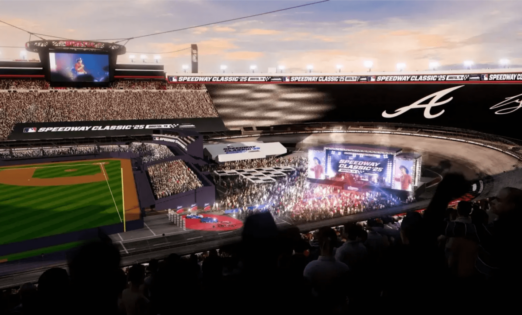The energy at Bristol Motor Speedway was palpable long before the first pitch of the inaugural MLB Speedway Classic. Fans had come from all corners, drawn by the unique blend of America’s pastime and the roar of NASCAR’s legendary venue. Transforming a storied half-mile bullring into a sprawling baseball stadium was no small feat, promising a record crowd and an unforgettable spectacle. Yet, amid the anticipation, the pulsating excitement began to unravel once the gates opened.
Lines snaked endlessly, concessions faltered under pressure, and the rhythm of a once-smooth event faltered. Fans, packed shoulder to shoulder found themselves wrestling more with the basics—food, drink, and directions than the game itself. This was not merely a hiccup but a crescendo of frustration echoed loudly across social media, putting the spotlight squarely on operational woes. Before the scoreboard lit up, a storm was already brewing off the field.
MLB Speedway Classic: A grand vision meets logistical gridlock
The MLB Speedway Classic was designed as a groundbreaking event, pushing boundaries to meld two of America’s cherished sports. Bristol Motor Speedway, a venue famous for historic NASCAR races and packed crowds exceeding 150,000, was reimagined to host Major League Baseball’s first game ever played in Tennessee. The Cincinnati Reds faced off against the Atlanta Braves on a baseball diamond meticulously laid out within the racetrack’s infield. According to Jerry Caldwell, Bristol’s president and general manager, the goal was to set records and engineer an atmosphere teased as extraordinary by baseball veterans like Sean Casey.
“The way the venue looks really is something that you can put on paper, but you really can’t get a true vision of it until you actually put grandstands on the infield of the track, and you put 3,500 seats in the middle of 87,000 seats,” Jeremiah Yolkut, MLB’s senior vice president of global events, said Friday.“Those things just don’t become a reality until you actually see them.”
The field construction was an engineering marvel: 17,500 tons of gravel were shifted, pit walls reconfigured, and even the imposing Colossus video board hung in foul territory to maintain sightlines and the classic ballpark feel. The event promised not just a game but a spectacle, merging musical headliners like Tim McGraw with NASCAR-inspired uniforms and fan experiences unique to both sports.
However, the massive scale brought significant logistical challenges. While the track accommodated an unprecedented attendance with tickets easily exceeding 85,000, a number set to break long-standing MLB records, the influx tested the limits of staff and infrastructure. Long before the first pitch, fans encountered understaffed gates leading to crushingly long entry times. Concession stands buckled under demand; fans faced waits exceeding an hour or simply went empty-handed due to resource shortages.
Typical race-day food options paled in variety and quantity compared to what fans had come to expect at Bristol. Directions, signage, and communication appeared fragmented, leaving many confused. The unique setting complicated matters—transporting food and staffing to racetrack concessions ill-equipped to handle a baseball crowd added strain.
Despite these mounting tensions, some players expressed admiration for the scale and novelty. Braves president Derek Schiller highlighted the event’s promise as a uniqueness unmatched, recognizing the passionate fan bases blending NASCAR loyalty with baseball fervor. But even such praise could not mask the growing complaints brewing among fans hungry and frustrated in the stands.
Fans’ unfiltered voices: the backlash and response
Once the game day chaos unfolded, social media erupted with candid fan accounts that framed the unfolding crisis at Bristol Motor Speedway. The dominant theme was one of severe understaffing and inadequate logistics, turning what should have been a historic celebration into a test of patience.
One fan lamented, “@MLB not going to plan. Lines are ridiculous. Stands are running out of food.” Another posted, “Total sh*t show here, they are out of food and starting to be out of beer, no estimate for when the game will start. #SpeedwayClassic.” Fans crowded in long queues found their experience diminished, with one tweeting, “Wayyyy understaffed. Every concession line is over an hour long. Very few food/concession options compared to a race at BMS. @ItsBristolBaby #SpeedwayClassic.” Signage and amenities felt lacking as well, with commenters highlighting, “No ponchos, terrible directions, zero signage. Tried to buy a garbage bag and the concession lady said no.”
Total shit show here, they are out of food and starting to be out of beer, no estimate for when the game will start. #SpeedwayClassic pic.twitter.com/eAVKpEZpDA
— Aaron (@acw673) August 3, 2025
This groundswell of dissatisfaction wasn’t mere griping but a collective voice signaling inadequate preparation for the scale and complexity of hosting a baseball game in a traditional racetrack environment. Yet, amid the frustration, some fans embraced the chaos as part of the Bristol mystique. One noted with humor, “Well… anyone who wanted the full NASCAR Experience @ Bristol is getting just that! A friend sent me a pic from the game and it raining and I laughed my ass off, given the number of years I’ve sat in those same stands getting rained on.”
The contrast between the high hopes set by MLB’s outsize ambitions and the operational struggle with staffing and provisioning illustrates critical tensions. As first-time event staff and venue operators tried to pivot from motor racing to baseball crowds, the fans’ experiences revealed gaps not fully bridged. These candid reactions underscore that even the most innovative sports ventures must hinge on flawless execution beyond just spectacle and substance. Bristol’s MLB Speedway Classic will be remembered not only for its record crowd and novelty but as a cautionary tale one where passion and scale collided with real-world logistics, fueling a conversation on how sports franchises can better align vision with fan experience in unique venues.
The post MLB Speedway Classic: Calls Mount Against ‘Understaffed’ Bristol Motor Speedway After Major Crisis appeared first on EssentiallySports.



